|
|
|
Sort Order |
|
|
|
Items / Page
|
|
|
|
|
|
|
| Srl | Item |
| 1 |
ID:
114872
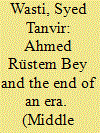

|
|
|
|
|
| Publication |
2012.
|
| Summary/Abstract |
Ahmed Rüstem Bey was accredited as Ottoman Ambassador to the United States of America at a critical juncture before the First World War. The Ottoman Empire had weakened as a result of revolts by many minorities agitating for self-determination and a series of military conflicts culminating in the Balkan Wars. Ahmed Rüstem Bey, though born in Turkey of non-Turkish parentage, was a dyed-in-the-wool Ottoman who felt deeply attached to his country. As Ambassador his stay in the US was short and controversial. Information on Ahmed Rüstem's life and career needs augmentation, and the present article represents an initial attempt to portray this unconventional diplomat.
|
|
|
|
|
|
|
|
|
|
|
|
|
|
|
|
| 2 |
ID:
047352
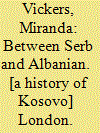

|
|
|
|
|
| Publication |
London, Hurst and Company, 1998.
|
| Description |
xix, 328p.pbk
|
| Standard Number |
1850653585
|
|
|
|
|
|
|
|
|
|
|
|
Copies: C:1/I:0,R:0,Q:0
Circulation
| Accession# | Call# | Current Location | Status | Policy | Location |
| 044857 | 949.71/VIC 044857 | Main | On Shelf | General | |
|
|
|
|
| 3 |
ID:
111244
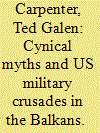

|
|
|
|
|
| Publication |
2011.
|
| Summary/Abstract |
Misleading propaganda and the creation of false history were pervasive and corrosive during the Balkan wars of the 1990s. Both the Clinton administration and the news media were responsible for the disreputable situation. And unlike the discrediting of the Bush administration's distorted accounts regarding the Iraq crisis, the Balkan myths are as prevalent today as when they were first created. That situation is dangerous on two counts. First, it inhibits the formulation of intelligent, realistic, and equitable policies regarding current Balkan issues. Second, the success of such a campaign of disinformation creates the irresistible temptation for officials and policy lobbies to try the same techniques during future international crises in that region or elsewhere.
|
|
|
|
|
|
|
|
|
|
|
|
|
|
|
|
| 4 |
ID:
192260
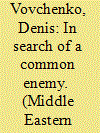

|
|
|
|
|
| Summary/Abstract |
The uneasy Putin-Erdogan partnership reminds of the early twentieth-century trends in the Russo-Turkish relations – taking advantage of each other’s dissidents vs cooperating against Western imperialism. Imperial Russia tended to indulge in the former which undermined the latter tendency in its policies in regards to the Young Turk regime who were similarly making irredentist overtures to Russian Muslim minorities. Both sides were also tempted or constrained by their existing or potential Great Power allies. In contrast, the partnership between the Soviets and Mustafa Kemal Ataturk would be more consistent as they minimized meddling in each other’s internal affairs to jointly oppose European encroachments. This article also shines a new archival light on the motivations of the Soviet side while highlighting the less well-known opposition to close cooperation between traditional rival empires on all levels of Soviet leadership. There is no scholarly work focusing on the 1908–1923 period in a single monograph or article (from the Young Turk revolution to the Lausanne negotiations). Looking at both sides of the 1917 divide reveals surprising continuity between the imperial and the Soviet policies despite the earthshattering effects of the First World War.
|
|
|
|
|
|
|
|
|
|
|
|
|
|
|
|
| 5 |
ID:
089117
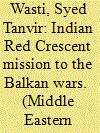

|
|
|
|
|
| Publication |
2009.
|
| Summary/Abstract |
Indian Muslim political development during the early years of the twentieth century contained a significant pan-Islamic component of solidarity, especially with the peoples of the beleaguered Ottoman Empire. Although this sentiment was later to be channelled into organized internal political activity such as the foundation of the Muslim League, it had its beginnings in various agitations such as the Khilafat Movement. The Indian Red Crescent Mission to Turkey may be said to have provided the initial mise-en-sc ne for the expression of political sympathy towards Turkey and the generation of a local freedom movement among the Muslims of India.
|
|
|
|
|
|
|
|
|
|
|
|
|
|
|
|
| 6 |
ID:
170987
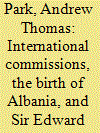

|
|
|
|
|
| Summary/Abstract |
International commissions played an important but overlooked role in Great Power diplomacy during the Balkan Wars of 1912–1913. In establishing the new state of Albania, they served as tools of preventive diplomacy that enabled the Great Powers to avoid a disastrous direct confrontation. This analysis examines the use of such commissions and argues that although they succeeded in preventing Great Power conflict in the short-term, their instrumental use opened new avenues of tension amongst the Great Powers and came at the expense of the national principle. The exegesis highlights how the use of commissions developed in the context of situations of malleable sovereignty that occurred in the wake of the receding Ottoman Empire and suggests that understanding the Great Power commissions of the Balkan Wars can help illuminate the use of similar tools during the Paris Peace Conference of 1919.
|
|
|
|
|
|
|
|
|
|
|
|
|
|
|
|
| 7 |
ID:
147966
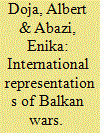

|
|
|
|
|
| Summary/Abstract |
This article introduces the socio-anthropological concept of international representations to examine the relationship between a civilizational rhetoric, the West European and the international politics of otherization and containment of Southeast Europe, and an essentialist and timeless bias in international relations theory, including both radical and constructivist trends. We first explore the different narrative perspectives on the Balkan wars from the beginning to the end of the twentieth century. Their subsequent problematization is aimed at challenging the way they have constructed commonplace and time-worn representations, which international society shares with different consequences in international affairs. This is a limited conception since international representations as a socio-anthropological concept are always socially, culturally and politically constructed, contested and negotiated. They do not neutrally refer to a reality in the world; they create a reality of their own. Moreover, this limited conception ignores the fact that how, by whom and in whose interest international representations are constructed is itself a form of power in international relations. Therefore, the way international representations are constructed can be problematized as an example of political and ideological projects that operate in the West as well as in the Southeast European countries that are the object of Western foreign policy.
|
|
|
|
|
|
|
|
|
|
|
|
|
|
|
|
| 8 |
ID:
122121
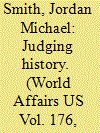

|
|
|
|
|
| Publication |
2013.
|
| Summary/Abstract |
During the volatile confirmation hearings for secretary of defense nominee Chuck Hagel, Republicans asked the former senator for his judgment on the US "surge" in Iraq. Hagel responded: "Well, I would defer to the judgment of history to sort that out."
|
|
|
|
|
|
|
|
|
|
|
|
|
|
|
|
| 9 |
ID:
047200
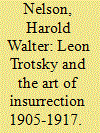

|
|
|
|
|
| Publication |
London, Frank Cass, 1988.
|
| Description |
viii,158p.Hbk
|
| Series |
Cass Series on Politics and Military Affairs in the 20th Century
|
| Standard Number |
0714632724
|
|
|
|
|
|
|
|
|
|
|
|
Copies: C:1/I:0,R:0,Q:0
Circulation
| Accession# | Call# | Current Location | Status | Policy | Location |
| 044684 | 947.083/NEL 044684 | Main | On Shelf | General | |
|
|
|
|
| 10 |
ID:
161358
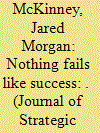

|
|
|
|
|
| Summary/Abstract |
During the July Crisis Britain’s foreign secretary, Sir Edward Grey, focused on organising a conference through which differences could be reconciled. After the war, he maintained that Germany’s unwillingness to join this conference was one of the immediate causes of war. This essay disputes Grey’s contention, arguing that his plans for a conference, based on a misleading analogy to the previous Balkan Crises, actually helped facilitate the outbreak of war in 1914 by sanctioning inaction in the first phase of the crisis (28 June–22 July) and by tacitly encouraging Russian mobilisation in the second phase (23 July–4 August).
|
|
|
|
|
|
|
|
|
|
|
|
|
|
|
|
| 11 |
ID:
152179
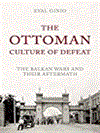

|
|
|
|
|
| Publication |
London, C Hurst and Co. (Publishers) Ltd., 2016.
|
| Description |
xix, 377p.: imageshbk
|
| Standard Number |
9781849045414
|
|
|
|
|
|
|
|
|
|
|
|
Copies: C:1/I:0,R:0,Q:0
Circulation
| Accession# | Call# | Current Location | Status | Policy | Location |
| 058997 | 954.015/GIN 058997 | Main | On Shelf | General | |
|
|
|
|
| 12 |
ID:
158372
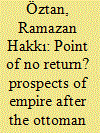

|
|
|
|
|
| Summary/Abstract |
In late 1912, the Ottoman imperial armies suffered a series of quick defeats at the hands of the Balkan League, comprising Greece, Serbia, Bulgaria, and Montenegro, resulting in significant territorial losses. The Ottoman defeat in the Balkan Wars (1912–13) often stands at the center of teleological accounts of a neat and linear transition from Ottoman Empire to Turkish Republic. These teleological readings see the Ottoman defeat as a historical turning point when Ottoman elites turned nationalist, discovered Anatolia, and embraced the Turkish core. This article contends that such approaches frame late Ottoman history in anticipation of the later reality of nation-states, and overlook the messy and historically complex nature of the collapse of empire and the emergence of the nation-state. Although the defeat was certainly shocking for the Ottoman ruling elite, I argue that it initiated an era of debate rather than one of broad consensus. Similarly, the defeat neither marked the end of the Ottoman Empire nor heralded the coming of the Turkish Republic, but rather reinvigorated the Ottoman imperialist project.
|
|
|
|
|
|
|
|
|
|
|
|
|
|
|
|
| 13 |
ID:
187034
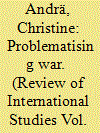

|
|
|
|
|
| Summary/Abstract |
This article redirects extant critiques of the modern problem of war at this problem's underlying logic of deviance. According to this logic, war constitutes a kind of international conduct that contravenes behavioural norms and that can be corrected through diagnostic and didactic means. Thereby, war is rendered into a problem falling within the scope of human agency. However, this agency rests on and reproduces this logic's constitutive blind spots. Therefore, it seems imperative to develop ways of problematising war otherwise. The article provides two starting points for (critical) IR scholarship seeking to undertake such a project. Firstly, it combines two Foucaultian tools, the concept of problematisation and the method of genealogy, to direct critique at the logics underlying our evaluative – analytical, ethical, and political – judgements. Secondly, it uses these tools to trace the contingent emergence of the logic of deviance in a crucial example within the wider genealogy of the problem of war: the Carnegie Endowment's commission of inquiry into the Balkan Wars of 1912 and 1913. Based on original archival research, I highlight different elements of this inquiry's problematisation of war – its frames, assumptions, ways of knowing, and subjects of knowledge – to make them available for reconstruction.
|
|
|
|
|
|
|
|
|
|
|
|
|
|
|
|
| 14 |
ID:
028695
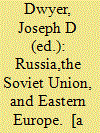

|
|
|
|
|
| Publication |
Stanford, Hoover Institution Press, 1980.
|
| Description |
xi, 233p.Hbk
|
| Standard Number |
0817950117
|
|
|
|
|
|
|
|
|
|
|
|
Copies: C:1/I:0,R:0,Q:0
Circulation
| Accession# | Call# | Current Location | Status | Policy | Location |
| 019661 | 947/DWY 019661 | Main | On Shelf | General | |
|
|
|
|
| 15 |
ID:
045924
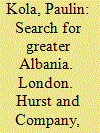

|
|
|
|
|
| Publication |
London, Hurst & Company, 2003.
|
| Description |
xv, 416p.hbk
|
| Standard Number |
1850656649
|
|
|
|
|
|
|
|
|
|
|
|
Copies: C:1/I:0,R:0,Q:0
Circulation
| Accession# | Call# | Current Location | Status | Policy | Location |
| 046929 | 949.65/KOL 046929 | Main | On Shelf | General | |
|
|
|
|
| 16 |
ID:
122002
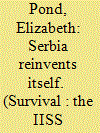

|
|
|
|
|
| Publication |
2013.
|
| Summary/Abstract |
Back in the 1990s, Ivica Dacic, known as 'Little Slobo', was the spokesman who justified strongman Slobodan Milosevic's conquests of neighbouring non-Serbs in the Balkan wars. Aleksandar Vucic, as the information minister of Yugoslav President Milosevic, was the hatchet man for the media who defended the vast ethnic cleansing by paramilitary police of more than 60% of the 90%-majority Albanians living in the Serbian province of Kosovo. Tomislav Nikolic was the deputy leader of the Serbian Radical Party that berated Milosevic for being too soft and not seizing much more contiguous territory for a Greater Serbia; the party's founder, Vojislav Seselj, would shortly report to The Hague for trial on war-crimes charges.
|
|
|
|
|
|
|
|
|
|
|
|
|
|
|
|
| 17 |
ID:
162836
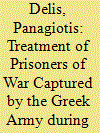

|
|
|
|
|
| Summary/Abstract |
In 1899 and 1907, international conventions providing for more humane treatment of prisoners of war (POWs) were signed at The Hague. But these new international norms seem to have done little to alleviate the mistreatment of POWs in the Balkan Wars in southeastern Europe in 1912–13. This article seeks to explain why this occurred by using the treatment of Ottoman and Bulgarian POWs held by the Greeks in the 1912–13 wars as a test case. Two intermingled factors seem to have led to the violation of the Hague Conventions: the inability of economically strapped Greece to cope successfully with such an urgent humanitarian situation and the negative stereotypes of the enemy, which were enhanced by combat brutalization. The participants in the two Balkan wars appropriated long extant European stereotypes of Balkan peoples as backward and uncivilized and applied them to their opponents.
|
|
|
|
|
|
|
|
|
|
|
|
|
|
|
|
|
|
|
|
|